(完整word版)高中英语语法—省略句
高中英语省略句
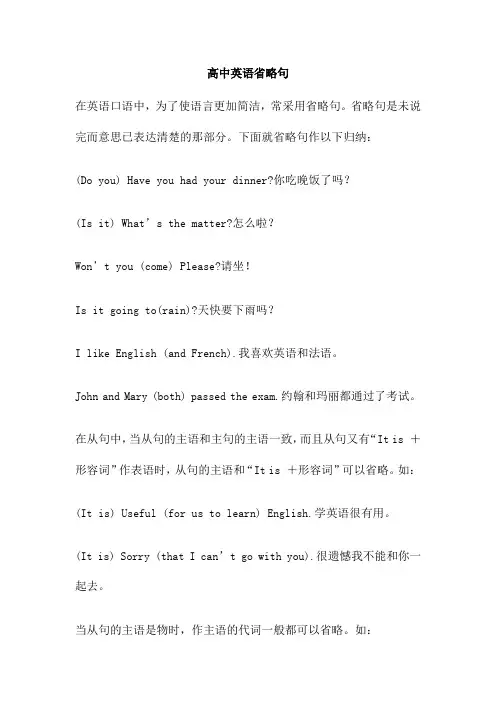
高中英语省略句在英语口语中,为了使语言更加简洁,常采用省略句。
省略句是未说完而意思已表达清楚的那部分。
下面就省略句作以下归纳:(Do you) Have you had your dinner?你吃晚饭了吗?(Is it) What’s the matter?怎么啦?Won’t you (come) Please?请坐!Is it going to(rain)?天快要下雨吗?I like English (and French).我喜欢英语和法语。
John and Mary (both) passed the exam.约翰和玛丽都通过了考试。
在从句中,当从句的主语和主句的主语一致,而且从句又有“It is +形容词”作表语时,从句的主语和“It is +形容词”可以省略。
如:(It is) Useful (for us to learn) English.学英语很有用。
(It is) Sorry (that I can’t go with you).很遗憾我不能和你一起去。
当从句的主语是物时,作主语的代词一般都可以省略。
如:The book (that I read yesterday) is very interesting.我昨天读的那本书很有趣。
在定语从句中,当先行词在定语从句中作状语时,关系代词可以省略。
如:The way (that/which) we use is more convenient.我们使用的方法更简便。
The reason (why) he was late is that he had to help the old lady across the street.他迟到的原因是他得帮助那位老太太过马路。
在一些表示建议、请求、命令等含义的动词后的宾语从句中,谓语动词常省略。
如:I suggest (that) we (should) discuss the matter.我建议我们讨论这个问题。
高中英语知识点归纳省略句的分类与用法
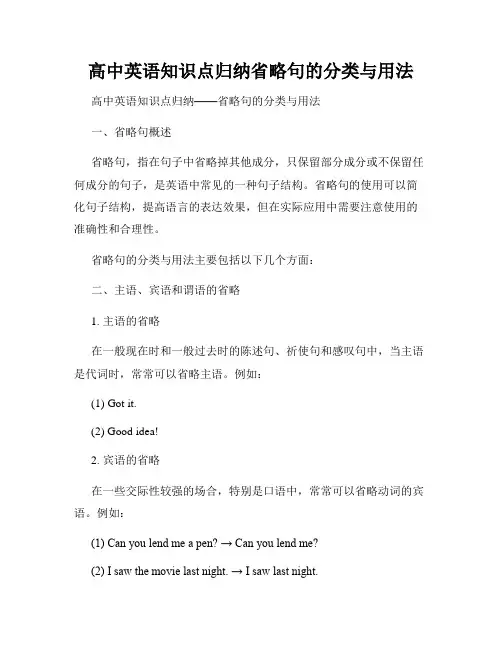
高中英语知识点归纳省略句的分类与用法高中英语知识点归纳——省略句的分类与用法一、省略句概述省略句,指在句子中省略掉其他成分,只保留部分成分或不保留任何成分的句子,是英语中常见的一种句子结构。
省略句的使用可以简化句子结构,提高语言的表达效果,但在实际应用中需要注意使用的准确性和合理性。
省略句的分类与用法主要包括以下几个方面:二、主语、宾语和谓语的省略1. 主语的省略在一般现在时和一般过去时的陈述句、祈使句和感叹句中,当主语是代词时,常常可以省略主语。
例如:(1) Got it.(2) Good idea!2. 宾语的省略在一些交际性较强的场合,特别是口语中,常常可以省略动词的宾语。
例如:(1) Can you lend me a pen? → Can you lend me?(2) I saw the movie last night. → I saw last night.3. 谓语的省略在上下文已经明确的情况下,可以省略谓语动词。
例如:(1) Have you finished your homework? → Yes, I have.(2) I didn't see you at the party. → No, I didn't.三、定语和状语的省略1. 定语的省略当被修饰语已经被前面提及或上下文中明确时,可以省略定语从句中的关系代词或连词。
例如:(1) The book that I borrowed from the library is very interesting. → The book I borrowed from the library is very interesting.(2) The girl who is wearing a r ed dress is my sister. → The girl wearinga red dress is my sister.2. 状语的省略在某些情况下,可以省略状语从句或状语从句中的一些成分。
高中英语省略句及练习讲解
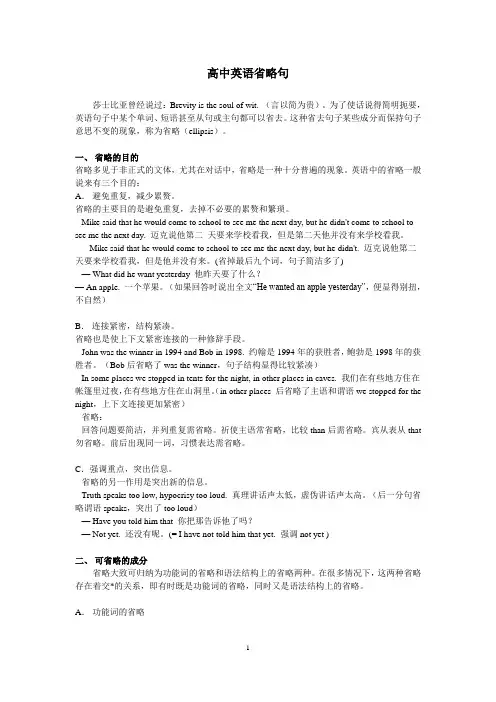
高中英语省略句莎士比亚曾经说过:Brevity is the soul of wit. (言以简为贵)。
为了使话说得简明扼要,英语句子中某个单词、短语甚至从句或主句都可以省去。
这种省去句子某些成分而保持句子意思不变的现象,称为省略(ellipsis)。
一、省略的目的省略多见于非正式的文体,尤其在对话中,省略是一种十分普遍的现象。
英语中的省略一般说来有三个目的:A.避免重复,减少累赘。
省略的主要目的是避免重复,去掉不必要的累赘和繁琐。
Mike said that he would come to school to see me the next day, but he didn't come to school to see me the next day. 迈克说他第二天要来学校看我,但是第二天他并没有来学校看我。
-- Mike said that he would come to school to see me the next day, but he didn't. 迈克说他第二天要来学校看我,但是他并没有来。
(省掉最后九个词,句子简洁多了)— What did he want yesterday 他昨天要了什么?— An apple. 一个苹果。
(如果回答时说出全文“He wanted an apple yesterday”,便显得别扭,不自然)B.连接紧密,结构紧凑。
省略也是使上下文紧密连接的一种修辞手段。
John was the winner in 1994 and Bob in 1998. 约翰是1994年的获胜者,鲍勃是1998年的获胜者。
(Bob后省略了was the winner,句子结构显得比较紧凑)In some places we stopped in tents for the night, in other places in caves. 我们在有些地方住在帐篷里过夜,在有些地方住在山洞里。
高中英语知识点归纳省略句的种类与用法
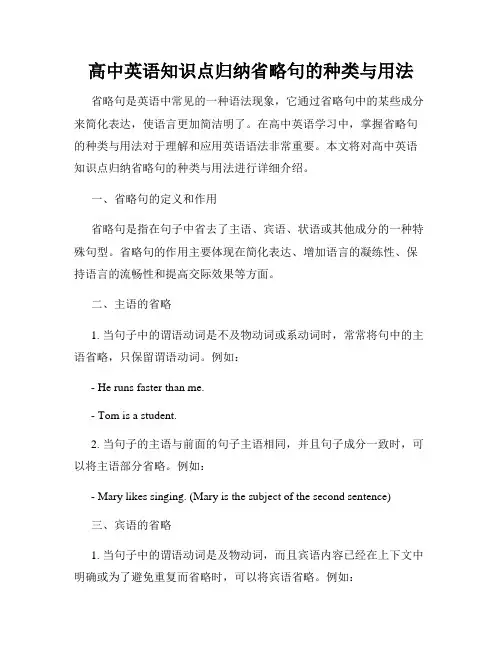
高中英语知识点归纳省略句的种类与用法省略句是英语中常见的一种语法现象,它通过省略句中的某些成分来简化表达,使语言更加简洁明了。
在高中英语学习中,掌握省略句的种类与用法对于理解和应用英语语法非常重要。
本文将对高中英语知识点归纳省略句的种类与用法进行详细介绍。
一、省略句的定义和作用省略句是指在句子中省去了主语、宾语、状语或其他成分的一种特殊句型。
省略句的作用主要体现在简化表达、增加语言的凝练性、保持语言的流畅性和提高交际效果等方面。
二、主语的省略1. 当句子中的谓语动词是不及物动词或系动词时,常常将句中的主语省略,只保留谓语动词。
例如:- He runs faster than me.- Tom is a student.2. 当句子的主语与前面的句子主语相同,并且句子成分一致时,可以将主语部分省略。
例如:- Mary likes singing. (Mary is the subject of the second sentence)三、宾语的省略1. 当句子中的谓语动词是及物动词,而且宾语内容已经在上下文中明确或为了避免重复而省略时,可以将宾语省略。
例如:- Can you speak French? Yes, I can. (French is the object of speak)四、状语的省略1. 当句子中的状语从句与主句的主语或宾语一致时,可以将状语从句中的主语或宾语省略。
例如:- He speaks English better than I (do). (I is the subject of do)- She likes swimming more than her sister (does). (Her sister is the subject of does)2. 当句子中的状语从句与主句的谓语动词一致时,可以将状语从句中的谓语动词省略。
例如:- I work harder than you (do). (Do is the verb of the subordinate clause)五、被动语态的省略1. 当句子中的被动语态中的被动助动词和be动词前面有介词时,可以将be动词和介词省略。
(整理版高中英语)二十三省略和插入语
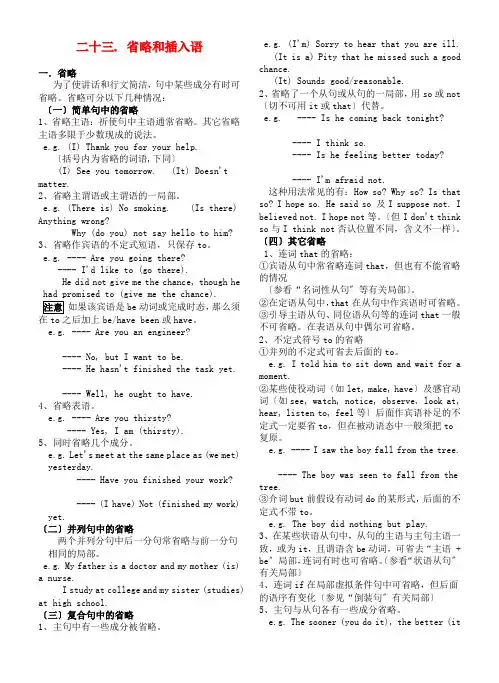
二十三.省略和插入语一.省略为了使讲话和行文简洁,句中某些成分有时可省略。
省略可分以下几种情况:〔一〕简单句中的省略1、省略主语:祈使句中主语通常省略。
其它省略主语多限于少数现成的说法。
e.g. (I) Thank you for your help.〔括号内为省略的词语,下同〕(I) See you tomorrow. (It) Doesn't matter.2、省略主谓语或主谓语的一局部。
e.g. (There is) No smoking. (Is there) Anything wrong?Why (do you) not say hello to him?3、省略作宾语的不定式短语,只保存to。
e.g. ---- Are you going there?---- I'd like to (go there).He did not give me the chance, though he如果该宾语是be动词或完成时态,那么须be/have been或have。
e.g. ---- Are you an engineer?---- No, but I want to be.---- He hasn't finished the task yet.---- Well, he ought to have.4、省略表语。
e.g. ---- Are you thirsty?---- Yes, I am (thirsty).5、同时省略几个成分。
e.g. Let's meet at the same place as (we met)yesterday.---- Have you finished your work?---- (I have) Not (finished my work) yet.〔二〕并列句中的省略两个并列分句中后一分句常省略与前一分句相同的局部。
(完整版)高中英语语法省略句
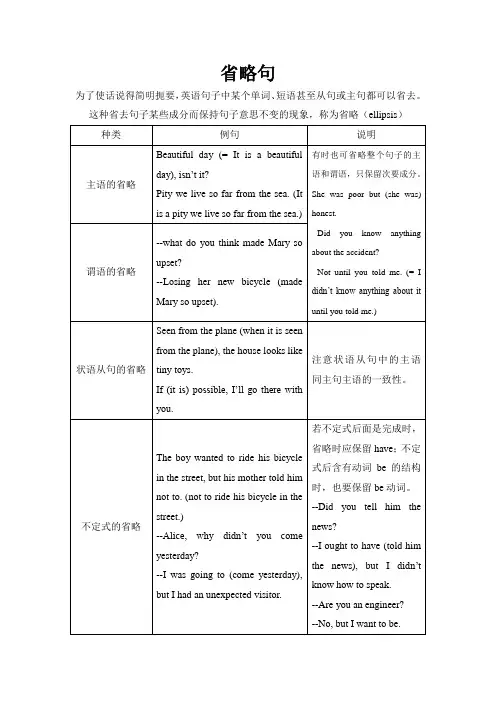
省略句为了使话说得简明扼要,英语句子中某个单词、短语甚至从句或主句都可以省去。
这种省去句子某些成分而保持句子意思不变的现象,称为省略(ellipsis)Ⅰ、状语从句中的省略用法一、如果从句的主语和主句的主语一致,且从句的谓语含有be动词的某种形式(am/is/are/was/were),可同时省略从句的主语和be动词的某种形式。
1、when,while引导的时间状语从句e.g. Do be careful when (you are) crossing the street.When/While (I was) on my way to work, I met her.2、if,unless,once引导的条件状语从句e.g. If (it is) properly treated, waste will do no harm to the environment.I’ll not go to the party unless (I am) invited.Once (you are) caught stealing in a supermarket, you will be punished.3、though,although,whether,no matter whether/what/how/who等引导的让步状语从句e.g. He was happy, though/although (he was) poor.Whether (she is) sick or well, she is always cheerful.No matter how/However hard the task (is), we must fulfill it in time.(注:从句的主语和主句的主语不一致时,只省略从句中的be动词形式)4、as if,as though引导的方式状语从句e.g. He rubbed his eyes and yawned as if/though (he was) waking up after along sleep.He stood up as if/though (he wanted) to leave.(as if/though + to do表示一个将来的动作)二、than,as引导的比较状语从句中的省略用法:当不同的主语进行比较时,一般省略从句中的谓语;当从句中的主语与谓语(be动词除外)和主句中的主语与谓语相同时,通常省略从句中的主语和谓语,只保留比较部分。
(完整word版)高考英语省略句常见的陷阱题型(一).docx
高考英语省略句常见的陷阱题型(一)省略是了避免重复、突出新信息而省略句中的一个或者几个句子成分并使上下文密接的一种法修辞手段。
在言用中,尤其在中,是一种十分普遍的象。
在英考中,也常会采用微型境的方法,使用省略手段来考陷阱,增加考的度。
在考陷阱中,所涉及的省略情况一般有:的省略、句子成分的省略、多个成分的同省略等。
一、承前省略陷阱所承前省略指的是当前后两句构相同,通常可将后一构与前一构相同的部分省略,从而使句子更。
一般来,种省略考生是可以根据上下文的境作出正确理解的,但是,当种省略与其他英句型相似并很容易生混淆,就可能冠李戴,步入区。
如果命者好抓住一点来巧妙,就很可能构成有一定度的陷阱。
如:1.— What should I do with this passage?—_____ the main idea of each paragraph. (重卷)A. Finding outB. Found outC. Find outD. To find out【分析】答案C。
很容易 A 或 D ,是考非。
根据句可知,完整的答是 You should find out⋯,此是承前省略You了should,所以就是Find out。
2. My friend Mary is _____ beautiful girl and _____ girl everyone likes to work with.A. a, aB. a, theC. the, aD. the, the 【分析】此很容易B,第一次提到girl用不定冠,第二次提到就用定冠。
但其最佳答案是 A 。
句中第二次提到girl并不是特指的,此句一省略句,充完整My friend Mary is a beautiful girl and she is a girl everyone likes to work with.再看两道 (答案 A) :(1) Jim is _______ brave boy and _______ boy never fearing anything.A. a, aB. a, theC. the, aD. the, the(2) It is really _______ useful dictionary and _______ dictionary every one of us needs.A. a, aB. a, theC. the, aD. the, the3. “ What made her struggle to become an artist so hard?”“ ______ she was a woman.A. /B. WhenC. ThatD.What【分析】此题最佳答案选C。
高中英语语法-省略句
: Unlesshhee is invited, he won’t come.
: Unlesshe is invited, he won’t come. : Whilehhee is doing house work, my father often listens to music. : While he is doing house work, my father often listens to music.
2、省略主谓或主谓语的一部分。如:
(省略主语和谓语)
: What/How (do you think) about a cup of tea ? : Why (do you) not say hello to him ?
3、省略表语。
: –Are you thirsty? – Yes, I am(.thirsty). : His brother isn’t lazy, nor is his sister(.lazy).
※介词的省略※(考点)
1. 一些常和动名词、形容词一起搭配的介词常省 略,而保留其后的 动名词,常见的句型有
spend/waste time (in) doing, lose no time (in) doing; have difficult/trouble (in) doing; be busy (in) doing; stop/prevent sb. (from) doing 等。
: The order that we(sshhoouuldld) stay where we are is very serious and severe.
: It’s very important that students(shshoouuldld) study hard at school.
高考英语省略知识点
高考英语省略知识点在高中英语学习中,我们经常会遇到一种语法现象,那就是省略。
省略是指根据上下文语境和语言习惯而省略某些词或短语的现象。
掌握省略知识点,对于高考英语考试是非常重要的。
本文将从不同角度论述英语省略知识点。
一、主语或谓语的省略英语中经常会出现主语或谓语省略的情况。
这种省略可以通过上下文来理解具体含义。
例如:1. It's raining heavily.(外面)(正在)下大雨。
在这个句子中,主语 "it" 被省略了。
当我们用 "it" 作形式主语表示天气状况时,原句中的it 可以被省略,只保留形式主语代词。
2. Can swim?(你)会游泳吗?这个问句中,主语 "you" 被省略了。
在一般疑问句中,主语常常被省略。
3. Coming!(我正在)来了!这个句子中,谓语 "am" 被省略了。
在表示将来的动作时,主语 "I" 的 "am" 可以省略。
二、宾语的省略在某些情况下,宾语可以被省略掉。
这种省略通常出现在某些固定句型中,常要根据上下文来理解。
例如:1. Can you pass (me) the salt?这个句子中,宾语 "me" 被省略了。
在交际用语中,表示请求或指示对方给予自己某物时,宾语往往被省略。
2. Let's go (to) the park.这个句子中,宾语 "to" 被省略了。
在 go, come, return, fly, drive 等表示“去”或“来”的动词后,表示地点的宾语常被省略。
三、连词的省略有时候,连词也可以被省略。
这种省略常见于并列连词和条件连词。
例如:1. You can have either apples (or) oranges.这个句子中,连词 "or" 被省略了。
省略句(完整归纳)
多变的省略句高考常考内容:1.省略主语,主谓语或主谓的一部分 2.不定式符号to的省略 3.不定式结构中动词的省略4.状语从句中的省略5.定语从句中关系词的省略6.虚拟语气中if和should的省略7.考查not, so, neither, nor的“替代性”省略掌握好省略句,应注意以下几条:1.感官动词或使役动词(如:notice, hear, let, make)等后接不定式作宾补时省略to,被动时to不能省略。
2.在pre fer to do rather than…, cannot help but…do, nothing …but等句型中常省略to。
3.为避免重复,作某些动词(hope, want)等宾语或(tell, order, ask)的宾补时,省略不定式短语,只保留to.4.应注意状语从句、定语从句中的省略。
5.注意not ,so ,neither, nor的“替代性”省略。
6.状语从句中,如果谓语含动词be,主语又与主句主语一致或主语是it,从句中主语和be一齐省略。
7.常见的省略形式:(1)If (it is)possible[如果可能的话];(2)If (it is) necessary[如果必要的话];(3)If any: 例: Correct the mistakes in the passage if (there is) any (mistakes)比较:Do you have anything to say? (不知道对方是否有话要说,) Do you have something to say?(认为对方有话要说.)一、替代省略1. 用it, one, that,ones, those替代句子中重复出现的名词、代词或句子。
one是指代同名称的另一样东西(同类异物),代替前面句子中重复出现的可数名词;that替代特指可数或不可数名词,后面常跟有in或of短语作后置定语;it指代同名称的同样事物(同类同物)。
- 1、下载文档前请自行甄别文档内容的完整性,平台不提供额外的编辑、内容补充、找答案等附加服务。
- 2、"仅部分预览"的文档,不可在线预览部分如存在完整性等问题,可反馈申请退款(可完整预览的文档不适用该条件!)。
- 3、如文档侵犯您的权益,请联系客服反馈,我们会尽快为您处理(人工客服工作时间:9:00-18:30)。
省略句一、如果从句的主语和主句的主语一致,且从句的谓语含有be动词的某种形式(am/is/are/was/were),可同时省略从句的主语和be动词的某种形式。
1、when,while引导的时间状语从句e.g. Do be careful when (you are) crossing the street.When/While (I was) on my way to work, I met her.2、if,unless,once引导的条件状语从句e.g. If (it is) properly treated, waste will do no harm to the environment.I’ll not go to the party unless (I am) invited.Once (you are) caught stealing in a supermarket, you will be punished.3、though,although,whether,no matter whether/what/how/who等引导的让步状语从句e.g. He was happy, though/although (he was) poor.Whether (she is) sick or well, she is always cheerful.No matter how/However hard the task (is), we must fulfill it in time.(注:从句的主语和主句的主语不一致时,只省略从句中的be动词形式)4、as if,as though引导的方式状语从句e.g. He rubbed his eyes and yawned as if/though (he was) waking up after along sleep.He stood up as if/though (he wanted) to leave.(as if/though + to do表示一个将来的动作)二、than,as引导的比较状语从句中的省略用法:当不同的主语进行比较时,一般省略从句中的谓语;当从句中的主语与谓语(be动词除外)和主句中的主语与谓语相同时,通常省略从句中的主语和谓语,只保留比较部分。
e.g. He is taller than his brother (is).I have as much as confidence in you as (I have confidence) in him.三、以if从句为代表的状语从句中的特殊省略用法:通常省略了it is,that is,there is/are。
e.g. If (it is) possible/necessary, this old temple will be rebuilt.If (that is) so, I will call you back at 5:00 pm.There are only a few books in our school library, if (there are) any.Ⅱ、定语从句中的省略用法关系词的省略关系代词that,which,whom等在限制性定语从句中充当宾语且不位于介词之后时,可以省略;in which或that在先行词way后作方式状语从句时可省略。
e.g. The man (that/who/whom) you visited last night is my grandpa.I don’t like the way (in which/that) you treat the girl.Ⅲ、虚拟语气中if及should的省略1、当条件状语从句中有were,had,should等时省略if,把它们提至句首,形成倒装句。
e.g. If I were a teacher, I would be strict with my students.= Were I a teacher, I would be strict with my students.2、Suggest,insist,order,require等表示建议、要求、命令的动词后接的名词性从句中,谓语动词常用“should+动词原形”,should可以省略。
e.g. The doctor suggested that he (should) try to lose weight.Ⅳ、不定式符号to的省略1、感官动词see,hear,feel,watch等和使役动词have,make,let等后接不定式作宾语时,不定式省略to。
2、do nothing but,can’t help but等结构常接省略to的不定式。
e.g. We didn’t do anything but stay at home watching TV yesterday.Hearing the news, she couldn’t help but cry.3、在特定语境中为了避免重复,当不定式再次出现时,在want,wish,hope,try,plan,like,love,hate后往往只保留to,而省略后面的动词。
但不定式后有be,have时,也保留be和have。
e.g. My parents encouraged me to go to college, but I didn’t want to.Ⅴ、So和not的替代性省略用于避免重复前面所说过的内容,替代词so/not替代肯定或否定的名词性从句。
可与believe,do,expect,fear,guess,hope,say,speak,suppose,think,I’m afraid等连用e.g. – Do you suppose he is going to attend the meeting? – I suppose not.Ⅵ、日常交际中的省略在情景会话中,答语常常省略不会引起歧义的主语、谓语或宾语部分,而只保留对方希望了解的内容。
在复合句或并列句中,也有省略主、谓、宾的情况。
e.g. – How many copies do you want? -- (I want) Three copies, please.-- Have you ever been to the Great Wall? -- No, (I have) never (been to the Great Wall).随讲随练1、—Lucy,could you please spare me a few minutes?—____,but I hope "a few minutes" won't turn into a few hours.A. It doesn't matterB. That's kind of youC. I'm afraid notD. I guess so2、—Hey,taxi!—_____—I want to go to the dentist's.A. Good morning, sir.B. Nice to see you, sir.C. Where to, sir?D. What are you going to do, sir?3、The doctor expresses his strong desire that the patient _____ immediately.A. be operated onB. operated onC. was operated onD. would be operated on4、When he came back, he found the bag he had ____ over the seat was gone.A. left to hangB. left hangingC. left hungD. to leave hanging5、Liu Xiang spoke slowly to the Special Olympic competitors so as to have them____.A. understand himB. to be understoodC. be understoodD. to understand him6、—Are there any English story books for us students in the library?—There are only a few, ____.A. if anyB. if haveC. if someD. if has7、Francis, ____born in Kentucky, lived and practiced law in Missouri.A. wasB. he wasC. althoughD. but8、—Does Betty know where her violin is?—She saw somebody walking off with one, but she doesn't know____.A. whoseB. itC. whomD. which9、—Aren't you the manager?—No, and I ____.A. don't wantB. don't want toC. don't want to beD. don't10、—How are you getting on with your work?—Oh, I'm sorry. Things aren't going so well as____.A. plansB. planningC. plannedD. to plan11、—What's the matter with you?—I didn't pass the test, but I still____.A. hope soB. hope toC. hope itD. hope that12、The doctor did what he could ___ the boy, but in vain.A. saveB. to saveC. savingD. saved13、—You look happy today, Mary.—I like my new dress and Mother ___, too.A. likesB. doesC. isD. do14、—What happened to the boy? He was making so much noise.—He wanted to play football, but his mother warned him ____.A. notB. toC. not toD./15、____ for your brother, I would not have gone to see Mr. Wang.A. If it is notB. Were it notC. Had it not beenD. If they were not参考答案:1-5 DCABA 6-10 ACACC 11-15 BBBCC。
